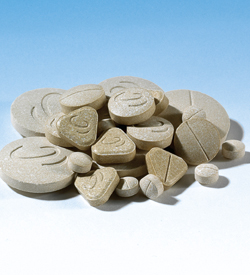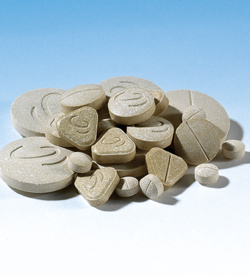Providing Quality & Trust
Metronidazole Gourmed Chew Tabs
Wedgewood Pharmacy
Starting at $87.88
$87.88 Each
Detailed Description
Metronidazole: Gourmed Chew Tabs
Metronidazole is an antibiotic that is used commonly to treat protozoal infections and anaerobic bacterial infections. It also has anti-inflammatory effects in the bowel. Metronidazole is bactericidal; it kills bacterial microorganisms by disrupting their DNA.
It is absorbed rapidly from the GI tract, metabolized by the liver and excreted in the urine and the feces. Because metronidazole only has activity against anaerobic bacteria, it is used commonly with other antibiotics when it is used to treat mixed-bacterial infections. It is compatible with many other antibiotics including penicillin antibiotics, aminoglycosides, and some cephalosporins.
Metronidazole may be prescribed for:
- Infection-Bacterial
- Infection-Parasitic
One of the dosage forms available for Metronidazole is Gourmeds Chewable Tablets. A Wedgewood Pharmacy exclusive. Gourmeds ® tasty, chewable tablets contain natural, food-grade ingredients in fish and chicken flavors that pets love. Gourmeds are available for the most commonly prescribed compounded preparations, and may make administering compounded preparations easy for pet owners.
Prescribed For:
- Dogs
- Cats
Dogs and Cats:
Metronidazole is used to treat protozoal infections in dogs and cats including Giardia, Entamoeba, Trichomonas, and Balantidium. It also is used to treat anaerobic bacterial infections. Metronidazole has immune-modulating activity and may be prescribed to treat inflammatory bowel disease. It may be used to treat colitis caused by other antibiotics, periodontal disease (especially in cats), Clostridium perfringens enterotoxemia, tetanus, diarrhea of undetermined cause, pancreatic insufficiency (with small-intestinal bacterial overgrowth), and complications of severe liver disease. Metronidazole may be used with corticosteroids to treat inflammatory bowel disease or gum disease (gingivitis/stomatitis) in cats. Topical metronidazole gel is used to treat skin infections, such as feline chin acne.
Metronidazole usually is tolerated better if given with food. There is a wide variety of flavors and preparations made by compounding pharmacies to deal with the problems associated with the bitter taste. Because of the variety of uses for this drug, dose amount, frequency, and duration of treatment vary widely.
Horses:
Metronidazole is used primarily with other antibiotics to treat mixed bacterial infections in which anaerobic bacteria are present, for example, pleuropneumonia, peritonitis, and abdominal abscesses. It also is used prophylactically after colic or other abdominal surgery when mixed bacterial infections are a risk. Metronidazole generally is given orally although it also is absorbed rectally. Rectal administration is used occasionally in the very sick patient when anorexia and weight loss are a problem.
Metronidazole Side Effects:
- Most common: clinical signs related to the bad taste or GI upset.
- Dogs and cats: excessive salivation, gagging, regurgitation, pawing at the mouth, nausea, vomiting, and decreased appetite are the most frequent complaints.
- Less common or rare: diarrhea, depression, lethargy, weakness, low white blood cell count, liver failure and blood in the urine, or dark urine due to pigment changes. Neurologic signs may be seen after accidental overdose or, more commonly, with long-term moderate-to-high-dose therapy as to treat difficult bacterial infections. Signs often begin seven to 12 days following the start of treatment.
- Horses: side effects are not associated commonly with metronidazole. The major problem with using this drug is its bad taste. Many horses stop eating when this drug is mixed with feed and a reliable method of administration must be found.
Precautions:
- Metronidazole causes birth defects in laboratory animals. It should be avoided in pregnant animals, especially in the first trimester. Some metronidazole is excreted in breast milk and it should not be used in lactating animals.
- Metronidazole should not be used in young puppies and kittens.
- Metronidazole should be avoided or used with caution, at reduced doses, in animals with kidney or liver disease.
Drug Interactions:
- Metronidazole is reported to elevate prothrombin time in animals on warfarin or other coumarin anticoagulants.
- Phenobarbital and phenytoin may increase the metabolism of metronidazole.

Powered by nopCommerce
This site is running in live payment mode. Real payments will be processed.

